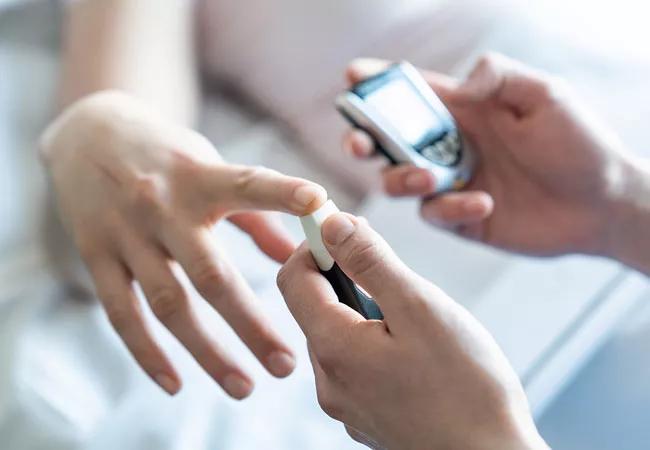Self-management gives patients autonomy

Some patients with Type 1 Diabetes can self-manage their insulin when being treated in an acute care setting for non-diabetes related problems, according to a Cleveland Clinic study.
Advertisement
Cleveland Clinic is a non-profit academic medical center. Advertising on our site helps support our mission. We do not endorse non-Cleveland Clinic products or services. Policy
Patient blood glucose levels, food intake and insulin dosages historically are managed by physicians and nurses in acute care settings. Study author Pamela Combs, DNP, MSN, BC-NP, in the Cleveland Clinic Department of Endocrinology, Diabetes and Metabolism, suggests rethinking that approach in certain patients with Type 1 Diabetes.
“Patients with Type 1 Diabetes have a unique understanding of their own disease and often are more capable of managing their own blood glucose than professionals on their healthcare team,” Combs says. “We should give them that latitude.”
The study, “Self-Management of Type 1 Diabetes in the Acute Care Setting,” collected data on 60 patients with Type 1 Diabetes in acute care settings at Cleveland Clinic main campus over a four-year period. Patients made decisions regarding their own insulin dosing based on blood glucose monitoring and meal intake. Patients’ self- managed either via multiple daily injections or a continuous subcutaneous insulin infusion pump.
In other research literature, rates of hypoglycemia (<70 mg/dl) and hyperglycemia (>180 mg/dl) in non-critical care environments were as high as 28.1%1 and > 40%2, respectively. In this study, more than 700 blood glucose readings were analyzed for both stable and unstable hypoglycemia and hyperglycemia. The frequency of unstable hypoglycemic and hyperglycemic events were < 5% each. Overall hyperglycemic events occurred at slightly higher rates in men, as well as in patients using injections instead of the insulin infusion pump. “Our low percentage of unstable adverse events suggested that self-management was safe and effective,” says Combs.
Advertisement
Hospitals seeking to undertake a self-management approach to diabetes care need to draft clear institutional policies supporting this practice, name strong team leaders to champion the process, and seek buy-in from multiple disciplines, says Combs.
Combs noted that self-management is not the right approach for all patients, and that patients need to be rigorously assessed to determine their motivation and diabetes knowledge.
“Once I determine that the patient is proficient in self-care and that we are speaking a common language, I allow them to self-manage. These patients are usually very ecstatic to find that they will be allowed to make their own insulin-dosing decisions while hospitalized,” she says. “Many have experienced serious poor sequelae in previous hospitalizations, where they were not permitted to self -manage.”
There is little research exploring the impact of self-management of blood glucose for hospitalized patients. Combs designed her study to address that gap, building on her 21 years of experience working with diabetic patients.
“Allowing hospitalized patients with Type 1 Diabetes to manage their own blood glucose through calculation and timing of insulin and meals may minimize the incidence of severe hypoglycemia and hyperglycemia, which are often seen in this population,” Combs concludes, “Self-management of insulin allows patients to continue enjoying autonomy. Healthcare providers should leverage their patients’ knowledge in order to gain insights into their decision-making process, and offer advice that can improve overall outcomes.”
Advertisement
Advertisement

Pheochromocytoma case underscores the value in considering atypical presentations

Advocacy group underscores need for multidisciplinary expertise

A reconcilable divorce

A review of the latest evidence about purported side effects

High-volume surgery center can make a difference

Advancements in equipment and technology drive the use of HCL therapy for pregnant women with T1D

Patients spent less time in the hospital and no tumors were missed

A new study shows that an AI-enabled bundled system of sensors and coaching reduced A1C with fewer medications